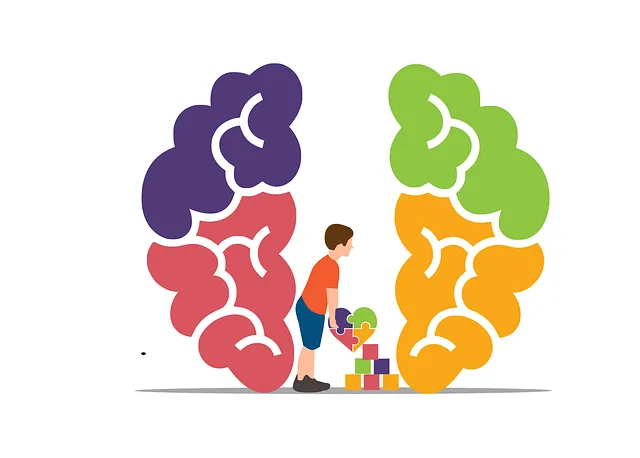The Kaiser Permanente behavioral health center in Littleton offers a holistic approach to mental wellness, prioritizing both individual and community well-being through open communication, evidence-based anxiety management techniques, and comprehensive strategies. Evaluating the program involves quantitative methods (pre/post surveys) and qualitative approaches (interviews, focus groups), with client feedback through satisfaction surveys driving continuous quality improvement. Data analysis guides enhancements, while cultural sensitivity ensures tailored interventions accessible to diverse participants, aligning with the center's commitment to optimal mental wellness outcomes.
“Explore the comprehensive evaluation methods employed by the Kaiser Permanente Behavioral Health Center in Littleton to assess the impact of their mental wellness programs. From understanding their unique approach to leveraging client feedback and satisfaction surveys, this article delves into key strategies for measuring program effectiveness. Additionally, it examines data analysis techniques and highlights the importance of community and cultural sensitivity in program evaluation. Discover how these methods empower Kaiser Permanente Littleton to continuously improve and optimize mental health services.”
- Understanding Kaiser Permanente Behavioral Health Center Littleton's Approach to Mental Wellness Programs
- Key Evaluation Methods for Measuring Program Effectiveness
- Client Feedback and Satisfaction Surveys: A Powerful Tool
- Data Analysis and Interpretation for Continuous Improvement
- Incorporating Community and Cultural Sensitivity in Program Evaluation
Understanding Kaiser Permanente Behavioral Health Center Littleton's Approach to Mental Wellness Programs

Kaiser Permanente Behavioral Health Center Littleton takes a holistic approach to mental wellness programs, focusing on both individual and community well-being. They believe that fostering open communication strategies among participants is key to successful treatment. By encouraging honest dialogue and creating safe spaces, the center aims to build a supportive environment where individuals can explore and develop effective self-care practices tailored to their unique needs.
The program emphasizes evidence-based techniques to manage and alleviate anxiety, one of the primary concerns in today’s fast-paced world. Through various interventions, participants learn coping mechanisms that promote resilience, enabling them to navigate life’s challenges with greater ease. This comprehensive strategy ensures that individuals not only find relief from immediate symptoms but also develop long-lasting tools for maintaining mental wellness.
Key Evaluation Methods for Measuring Program Effectiveness

When evaluating the effectiveness of mental wellness programs at institutions like the Kaiser Permanente behavioral health center in Littleton, several key methods emerge as essential tools. One primary approach involves the administration of pre- and post-program surveys to assess participant perceptions of their mental health status, mood, and overall well-being. These surveys provide valuable quantitative data on improvements experienced by individuals before and after engaging in the program, offering a direct measure of its impact.
Additionally, qualitative methods such as individual interviews or focus groups can yield profound insights into participants’ experiences. This allows for deeper understanding of changes in social skills, communication strategies, and mental wellness journaling exercises guidance adopted during the program. For instance, the Social Skills Training component might be evaluated through participant reports of improved interaction with peers and staff, while the Mental Wellness Journaling Exercise Guidance could be assessed by the frequency and depth of entries, reflecting increased self-reflection and emotional awareness.
Client Feedback and Satisfaction Surveys: A Powerful Tool

Client Feedback and Satisfaction Surveys are a powerful tool for evaluating mental wellness programs at Kaiser Permanente behavioral health centers, like the one in Littleton. These surveys provide direct insights into clients’ experiences, perceived benefits, and areas for improvement. By collecting feedback, mental health professionals can gauge the effectiveness of their services and tailor interventions to better meet individual needs. For instance, responses may highlight strengths in stress management techniques or communication strategies taught during sessions, as well as areas where additional support is required—like enhancing social skills training to foster stronger peer connections.
Regularly conducting these surveys allows for continuous quality improvement, ensuring that programs remain relevant and beneficial to the diverse populations served by Kaiser Permanente behavioral health centers. Feedback from clients helps in refining existing services and developing innovative solutions, ultimately contributing to improved mental wellness outcomes.
Data Analysis and Interpretation for Continuous Improvement

At the Kaiser Permanente behavioral health center Littleton, data analysis and interpretation play a pivotal role in fostering continuous improvement of mental wellness programs. By meticulously examining participant outcomes, engagement rates, and feedback from various initiatives, the center can identify areas that require enhancement or refinement. This iterative process involves utilizing advanced statistical methods to uncover trends, patterns, and correlations within the collected data. Such insights enable informed decisions aimed at optimizing program effectiveness and tailoring interventions to better meet the diverse needs of individuals seeking mental wellness support.
Moreover, these analytical techniques extend beyond mere performance metrics. They encompass evaluating the impact of healthcare provider cultural competency training and burnout prevention strategies on patient outcomes and staff satisfaction. This holistic approach ensures that the center’s programs not only address the symptoms but also foster a supportive environment that promotes resilience and overall well-being, ultimately enhancing the quality of care provided by the Kaiser Permanente behavioral health center Littleton.
Incorporating Community and Cultural Sensitivity in Program Evaluation

Incorporating community and cultural sensitivity is a vital aspect of evaluating mental wellness programs, especially at institutions like the Kaiser Permanente behavioral health center in Littleton. Effective evaluation methods must consider the diverse backgrounds and experiences of the participants to ensure that the program’s benefits are accessible and relevant to all. This involves understanding and respecting the unique cultural contexts in which the program operates. For instance, when implementing Stress Reduction Methods, it is essential to adapt practices to accommodate different cultural beliefs about health, wellness, and coping mechanisms.
Community engagement and input are key to this process. The Kaiser Permanente center can foster open communication with local communities to identify specific mental wellness concerns and develop tailored strategies. This collaborative approach enhances the program’s effectiveness by incorporating Cultural Sensitivity into Communication Strategies and Mental Wellness Journaling Exercise Guidance, ensuring that interventions are not only culturally competent but also community-driven.
The evaluation of mental wellness programs is a multifaceted process, as highlighted by Kaiser Permanente Behavioral Health Center Littleton’s comprehensive approach. By combining client feedback through satisfaction surveys, rigorous data analysis, and an inclusive community-focused perspective, the center ensures its programs effectively address diverse needs. This holistic evaluation method not only improves existing initiatives but also guides future developments, fostering a more tailored and impactful mental health care system for all.






